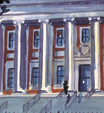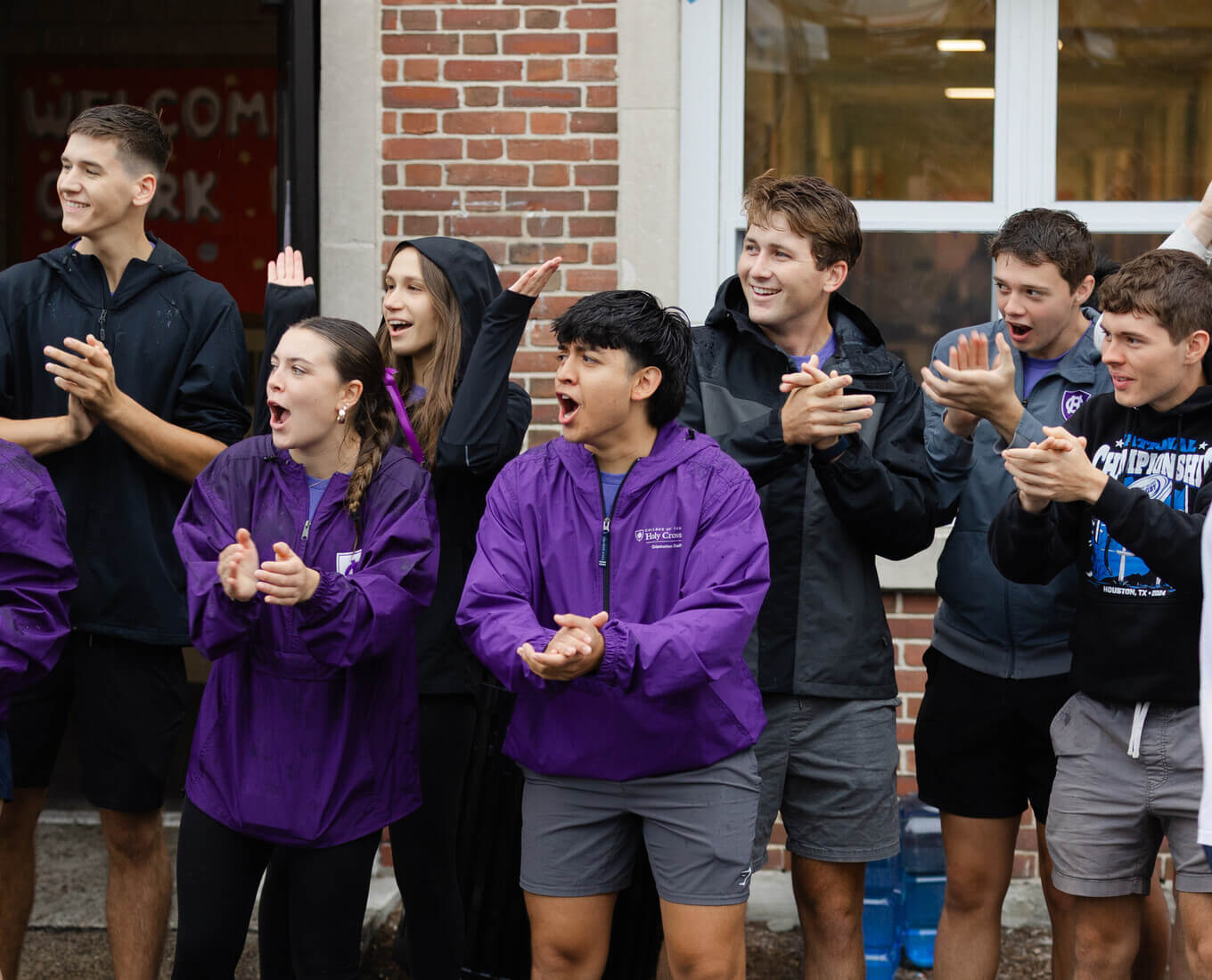 Holy Cross’ academic year consists of two semesters — fall and spring. But that doesn’t mean summer is completely devoted to vacation for members of the College’s faculty. Academic work is a year-round pursuit. Here’s a sampling of what some professors were engaged in this past summer:
Josep Alba-Salas, assistant professor of Spanish, was immersed in the history of the Spanish language. Using a large electronic corpus, he explored the evolution of certain Spanish structures from the 1200s to the year 2000. Funded by a Batchelor (Ford) foundation grant, his project ultimately seeks to explain how such structures arise and die in the history of a given language.
Holy Cross’ academic year consists of two semesters — fall and spring. But that doesn’t mean summer is completely devoted to vacation for members of the College’s faculty. Academic work is a year-round pursuit. Here’s a sampling of what some professors were engaged in this past summer:
Josep Alba-Salas, assistant professor of Spanish, was immersed in the history of the Spanish language. Using a large electronic corpus, he explored the evolution of certain Spanish structures from the 1200s to the year 2000. Funded by a Batchelor (Ford) foundation grant, his project ultimately seeks to explain how such structures arise and die in the history of a given language.
Leon Claessens, assistant professor of biology, in collaboration with other paleontologists from the Utah Museum of Natural History, colleagues from the Yale Peabody Museum and two Holy Cross summer research students, located and helped excavate the remains of dinosaur and other fossil reptiles in southern Utah in July and August.
Sarah Grunstein, assistant professor of music, gave piano recitals and master classes in Sydney and Melbourne, and presented a paper on Chopin sources for the postgraduate seminar at the University of Melbourne to students in musicology and performance. She also gave performance master classes at the Sydney Conservatorium of Music and the University of Melbourne. (While there she also took Holy Cross study abroad students to dinner!)
Lynn Kremer, professor of theatre, traveled to Bali for a month where she attended the Bali Arts Festival in Denpasar and watched a variety of performance styles including the newest adaptation of Sophocles Oedipus by I Wayan Dibia, who was a visiting fellow in the theatre department for several years. After her return, Kremer presented a talk about Dibia’s three versions of Oedipus that were created for three different audiences — including one production that was performed at Holy Cross — at the Association for Theatre in Higher Education (ATHE) Conference in New Orleans. ATHE is the only national conference on theatre in higher education.
Thomas Landy, associate director of the Center for Religion, Ethics and Culture and lecturer in sociology, in June led his fourth Ignatian Pilgrimage for faculty and administrators from Jesuit colleges and universities. The group, including 11 from Holy Cross, traveled to sites in northern Spain and Rome that were central to St. Ignatius and to the development of Jesuit education, including Loyola, Manresa, Montserrat, and Javier. At the General Curia in Rome, the group met with Rev. Peter-Hans Kolvenbach, S.J., superior general of the Society of Jesus.
Ellen Perry, professor of classics, ran a weeklong summer institute on the legacy of ancient Greece and Rome for about 100 high school teachers and classics enthusiasts at Dartmouth College in July. Perry is director of the Classical Association of New England Summer Institute (CANE), a professional organization for classicists in the region.
“As the 25th anniversary, the program was absolutely fascinating,” she says, “because it was about the legacy of the classical world in later periods, so we brought in both classicists and non-classicists — Renaissance scholars, 18th century scholars, political scientists, and others — to lecture and teach about the influence of Greece and Rome on later periods and cultures. It was a high energy week.”
David Schaefer, professor of political science, worked on several projects this summer. He participated in a 10-day seminar on world terrorism in Tel Aviv, Israel, sponsored by the Foundation for the Defense of Democracies. Along with some 40 other American college professors and some European scholars, he heard presentations on the subject by experts from Israel and other countries and also visited some strategic sites in Israel. In other scholarly activities, Dr. Schaefer published an op-ed article based on his new book Illiberal Justice: John Rawls vs. the American Political Tradition (University of Missouri Press) in The Wall Street Journal on July 23, and wrote a review of two other books on Rawls that is to appear in the journal Society. With the support of a Batchelor-Ford Faculty Fellowship, he completed an article on Arthur Armaingaud, a prominent interpreter of Montaigne’s Essays from the early twentieth century, that will appear in the journal Montaigne Studies next year. And he served as chair and discussant on a panel on “Friendship and Politics” at the annual meeting of the American Political Science Association in Chicago over Labor Day weekend.
May Sim, associate professor of philosophy, was conducting research for her forthcoming book titled, Continuous Confucianism: A Confucian Understanding of Human Rights. She also wrote two papers: “Being and Unity in the Metaphysics and Ethics of Aristotle and Liezi” is for a conference on Ethics in Ancient China and Greco-Roman Antiquity Symposium in Munich; and “Knowledge of the First Principles of Virtue in Zhu Xi and Aristotle” for a panel organized by the Committee on Asian philosophy and Asian Philosophers at the American Philosophical Association Eastern Division Meeting at Baltimore in December.
Rev. Thomas Worcester, S.J., associate professor of history, spent part of his summer completing work on The Cambridge Companion to the Jesuits, a volume of some 19 essays on the history of the Society of Jesus. Serving as editor of the volume, he assembled an international team of scholars to contribute essays, and he wrote three of the essays himself. The book is to be published in March 2008, by Cambridge University Press, in both hardcover and paperback editions.
Related Information:
• Read about some professors who worked with students on summer science research
• Holy Cross professor led workshop on biochemistry for Worcester school teachers
• Shakespeare in the Park
• Osvaldo Golijov served as composer-in-residence for Lincoln Center’s 2007 Mostly Mozart Festival
When they’re not teaching, professors conduct research, write, lecture
Summer Jobs
Read Time
4 Minutes
